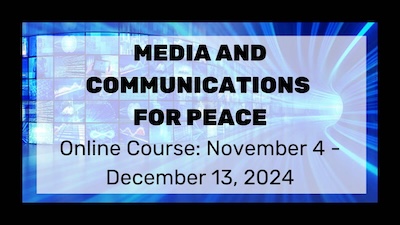
By David Swanson, World BEYOND War, July 12, 2023
There may be more U.S. tourists in Rome than Romans. It’s hard to get away from them — impossible if you are yourself one. But it’s a bit of a shame how they’ve taken over. Every square and street is wall-to-wall people. They’re not all American people. Some of them are Italian. Some of them are even Roman. But they all speak English. They all dress like Americans. Every bar and osteria caters to English-speaking tourists and their tastes. Via Veneto is a cartoon of itself, featuring not just a Hard Rock Cafe but even the headquarters of a government Department of Made In Italy with the “Made in Italy” in English. The Spanish Steps has been taken over by a press event for Tom “I’ll never make a sequel to Top Gun because that would be war propaganda” Cruise at which the majority of the fans are tourists. You’re as likely to find yourself alone and unjostled in a church or an alleyway as you are to forget the smell of the people you’re squeezed up against in a bus.
And yet, Rome remains stupendous, which is why the people have overrun it. The architecture and artwork remain staggeringly beautiful — if the stains from the car exhaust are scrubbed off sometimes. The cars have multiplied like the people, but driving has been maintained as a sport, as much as a means of transportation. Walking is still the best way to travel — and will remain enjoyable until the temperatures get into the 110s Fahrenheit, and — who knows — maybe we’ll adapt to that, too. Plus, the rentable scooters that have been strategically placed in the middle of every narrow path may seem an impediment until you’ve tried riding them. They are an individualistic, capitalistic, and chaotic development, but a Roman scooter ride is uniquely Roman. And Roman food cannot be made less than fantastic, no matter how hard the touristerias try.
Part of what concerns me as a vacationer who can’t quite forget the world while on vacation is simply the unsustainable population growth of our species, combined with the number of its members who are able to contribute to the burning of jet fuel — I mean directly, in addition to through their taxes for militaries. And part of what concerns me is the collection of trends, led by the United States, in the direction of more environmental destruction, more militarism, more concentration of wealth, and more degradation of public common goods. Don’t Europeans have a clue that what we Americans like about them is not just their beautiful architecture and music and food, and not just the beautiful languages that they used to speak, and not just their wealth, but primarily their socialism? I don’t want to visit a place that can convince me I’m in a U.S. shopping mall. I want to visit a place that thinks healthcare and education and vacation and retirement are human rights. That was what we loved, and still love, about Europe — even if we have never known it.
I recall a Rome and a Europe of 30 years ago. I loved the place then, as now. I didn’t complain about the crowds then. I complained about the lack of accommodation to foreigners. Look what that got me. But I am not old enough to recall a Europe of 80 years ago, or the fascism of that time. I don’t know what all the sources are of the stupid, homophobic, xenophobic politics we’re all cursed with today. Italy has no need for the courting of World War III that is underway in Ukraine. But Italy is part of an empire that is not based in Rome — rather in that imitation of Rome on that other Capitol Hill. It’s not just gelato-sellers catering to every desire of Americans. The people in charge in Rome employ augurs to decipher the wishes of Joe Biden’s mumbling, and then jump to do his bidding. They maintain U.S. nuclear weapons in Italy (and five other European nations), which Russia cites as its excuse to put them into Belarus. Italy is occupied by 13,000 U.S. troops in 40 bases. While Italy has ended mandatory participation in its military, and one doesn’t see automatic weapons in front of banks anymore, the security-theater of metal-detectors has spread, and when NATO declares peace unacceptable, Italy bows low and shouts “Yes! No problem! Would you like anything else, Sir?”
Or at least that’s the surface impression. There are other, contrary rumblings as well. The U.S. Embassy on Via Veneto has a rainbow flag, but it’s very carefully a modified rainbow flag to indicate support for LGBT rights. The British Embassy in Rome hasn’t quite caught on, and displays a simple rainbow flag, accidentally indicating its support for peace — a popular concept in Italy in a way not immediately familiar to someone from the United States or the United Kingdom. Bookstore windows in Italy — I mean, mainstream, corporate, including airport bookstore windows — display something no native English speaker would recognize or immediately believe possible: a book advocating the abolition of war, a book called Guerra alla Guerra by Matteo Pucciarelli, a book that includes the perspectives of actual peace activists, those mythical creatures that U.S. corporateland pretends do not exist — some of the very same Italian peace activists, in fact, who spoke this past weekend on a global 24-hour peace wave (see part 12). Yes, even a war abolition book by the Pope is disappeared by U.S. culture. Find me a Barnes & Noble in the United States with a war abolition book in the front window and I will eat it, page by page.
Italian peace advocates, including Pucciarelli in his book, lament the erosion of peace culture and the normalization of war. But there have been peace rallies in Italy for ending the war in Ukraine many, many times larger than any in the United States, and with far more prominent — current, not former — politicians taking part. Dock workers have blocked shipments of weapons to Ukraine in Italy, an act which there is simply no need to have any laws against in the United States. If the United States had the level of war opposition that Italy (or many other countries) does, we might have peace on Earth. Italians rightly protest the diversion of resources into weaponry rather than human or environmental needs, but if the United States had European levels of military spending, I’d have hope for saving the world; if the United States had European levels of environmental destruction the world would hardly even need saving yet. I don’t want to minimize the cover that bodies like NATO and the United Nations provide to sustain U.S. wars through the U.S. media and Congress, but it is important to have a little perspective. (And to hope that the peace activism in places like Italy can have a similarly supportive impact on that in the United States.)
It is striking that Pucciarelli recounts the wars of past decades and writes that it is now, during the war in Ukraine, not during the war in Iraq or countless other wars, that peace is being made shameful in Italian culture. Of course this is a change underway and far from completed. I’m struck by how far from completed it is. Pucciarelli recounts an incident in which a concert venue in Italy canceled a show by a Ukrainian band that had been raising funds for the fascistic Azov Battalion. In canceling the show — and kicking off an uproar of bellic outrage, including from the Ukrainian Ambassador to Austria who would later be so opposed to peace advocates so much as speaking with each other in Vienna — the concert venue noted that “We are against every war . . . .” They were not taking sides in a war but simply expressing a commonsense, non-controversial sentiment, or so they may have thought.
In the United States, “We are against every war” would never be stated by the most radical, hip, new, experimental corporation. Never. The necessary prefatory disclaimer that would be made in the United States is, on the contrary, “While we support the troops, . . . .” If film, television, advertising, music, language, clothing, work hours, and politics are any indication, that is where Italy is headed — unless the advance of “progress” can be successfully resisted.
The War Abolition Collection:
Guerra alla Guerra, by Matteo Pucciarelli, 2023.
War Is Hell: Studies in the Right of Legitimate Violence, by C. Douglas Lummis, 2023.
The Greatest Evil Is War, by Chris Hedges, 2022.
Abolishing State Violence: A World Beyond Bombs, Borders, and Cages by Ray Acheson, 2022.
Against War: Building a Culture of Peace by Pope Francis, 2022.
Ethics, Security, and The War-Machine: The True Cost of the Military by Ned Dobos, 2020.
Understanding the War Industry by Christian Sorensen, 2020.
No More War by Dan Kovalik, 2020.
Strength Through Peace: How Demilitarization Led to Peace and Happiness in Costa Rica, and What the Rest of the World Can Learn from a Tiny Tropical Nation, by Judith Eve Lipton and David P. Barash, 2019.
Social Defence by Jørgen Johansen and Brian Martin, 2019.
Murder Incorporated: Book Two: America’s Favorite Pastime by Mumia Abu Jamal and Stephen Vittoria, 2018.
Waymakers for Peace: Hiroshima and Nagasaki Survivors Speak by Melinda Clarke, 2018.
Preventing War and Promoting Peace: A Guide for Health Professionals edited by William Wiist and Shelley White, 2017.
The Business Plan For Peace: Building a World Without War by Scilla Elworthy, 2017.
War Is Never Just by David Swanson, 2016.
A Global Security System: An Alternative to War by World Beyond War, 2015, 2016, 2017.
A Mighty Case Against War: What America Missed in U.S. History Class and What We (All) Can Do Now by Kathy Beckwith, 2015.
War: A Crime Against Humanity by Roberto Vivo, 2014.
Catholic Realism and the Abolition of War by David Carroll Cochran, 2014.
War and Delusion: A Critical Examination by Laurie Calhoun, 2013.
Shift: The Beginning of War, the Ending of War by Judith Hand, 2013.
War No More: The Case for Abolition by David Swanson, 2013.
The End of War by John Horgan, 2012.
Transition to Peace by Russell Faure-Brac, 2012.
From War to Peace: A Guide To the Next Hundred Years by Kent Shifferd, 2011.
War Is A Lie by David Swanson, 2010, 2016.
Beyond War: The Human Potential for Peace by Douglas Fry, 2009.
Living Beyond War by Winslow Myers, 2009.
The Collapse of the War System: Developments in the Philosophy of Peace in the Twentieth Century by John Jacob English, 2007.
Enough Blood Shed: 101 Solutions to Violence, Terror, and War by Mary-Wynne Ashford with Guy Dauncey, 2006.
Planet Earth: The Latest Weapon of War by Rosalie Bertell, 2001.
Boys Will Be Boys: Breaking the Link Between Masculinity and Violence by Myriam Miedzian, 1991.








